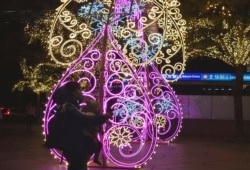When Taiwan’s president Tsai Ing-wen spoke this year to inaugurate her second term, she said ties with China had reached a “historical turning point” and that her government would “bolster ties with the United States.” She took another moment in the May 20 speech to thank Taiwan’s people for helping quash a short-lived local coronavirus outbreak.
Those talking points shaped up as dominant themes for Taiwan over most of 2020 and gave it a unique place on world geopolitical map.
The Western Pacific island of nearly 24 million people sidled up to one superpower, fellow democracy the United States, to help ease pressure from the other, China, while joining an elite group of small Asia Pacific governments that throttled COVID-19 instead of locking down.
China, which claims sovereignty over Taiwan despite the island’s self-rule of some seven decades, regularized military flights across the margins of Taiwanese airspace in what analysts described as pressure through fear. Taiwan logged 25 flyovers in October after a steady increase since June. A Chinese aircraft carrier group had passed through the 160-kilometer-wide Taiwan Strait in April.
China's leadership has called Taiwan its own since the Chinese civil war of the 1940s, when Chiang Kai-shek’s Nationalists lost to Mao Zedong’s forces and fled to the nearby island. Most Taiwanese have told government surveys since 2019 they oppose unification with China. Tsai, reelected by a landslide in January, endorses that sentiment.
The “normalized” Chinese military flights, though forced away by the Taiwanese air force, show that the island needs to bulk up its own defenses, said Andrew Yang, secretary-general of the Chinese Council of Advanced Policy Studies think tank in Taiwan.
“The bottom line is that you’re not going to allow Chinese to send its troops landing on our soil,” Yang said.
To that end, Taiwan began this year building eight diesel-powered attack submarines. However, 2020 is more likely to be remembered as one in which Taiwan was offered an arms sale every few weeks by Washington, up from just one or two per year before. In its most recent offer, the U.S. government approved the sale of military communications equipment plus other hardware for about $280 million.
President Donald Trump paired this year's sales with U.S. Navy activity near China’s coasts and two senior-level visits to Taiwan – acts that upset China and may be linked to the increase in military flyovers. Political scholars believe Trump befriended Taiwan, despite formal diplomatic ties with Beijing and none with Taipei, to stand tough against China amid widening Sino-U.S. trade, technology and consular spats.
Taiwan had been "under pressure” to take sides, ruling party legislator Lo Chih-cheng said.
“I have to say that this is one of the best relations we’ve had with the United States in the past few decades,” Lo said. “Now we are very happy that we began to routinize this kind of U.S. arms sales to Taiwan, so we have seen a lot of progress in this U.S.-Taiwan relationship.”
Success in COVID fight
Next year hangs in the balance as Taiwan and China wait for President-elect Joe Biden to announce his foreign policy agenda. China-related legislation introduced next year in the Legislative Yuan, Taiwan’s parliament, might rattle Beijing, Lo said. Some lawmakers are expected to try to change parts of the constitution to suggest more independence for Taiwan.
Taiwan got accolades from Washington as well as in Europe this year as it showed that early intervention can stop the spread of COVID-19. Authorities in Taipei checked and later stopped flights from China. They mandate 14-day quarantines from anyone entering from abroad and trace the contacts of any infected people. Macau, New Zealand and Vietnam have largely stamped out their infections too.
Taiwan’s hospitals had learned from the SARS, or severe acute respiratory syndrome, outbreak in 2003, said Wu Chia-yi, associate professor in the National Taiwan University College of Medicine’s nursing faculty. Medicine was ready, hospitals knew what to do and Taiwanese people have complied with face mask rules, Wu said.
Taiwan had logged a grand total of 757 cases as of Dec. 18, mostly Taiwan citizens or long-term residents who took flights in from abroad. Seven people have died in Taiwan from COVID-19 compared to 84 SARS deaths.
“Our peak was in March when the cases began. There was actually a spike and of course every day we had confirmed cases,” Wu recalled. “To be honest, the most important thing was that the medical personnel were able to cope with this problem and at that time the hospitals had made preparations. That’s the most amazing part. The internal meetings and the policies were all extremely strict.”
Taiwan still has its guard up because residents continue to come home from infected parts of the world. “If you ask me whether Taiwan still has a risk, I think there’s still the chance of an outbreak from imported cases,” Wu said.





